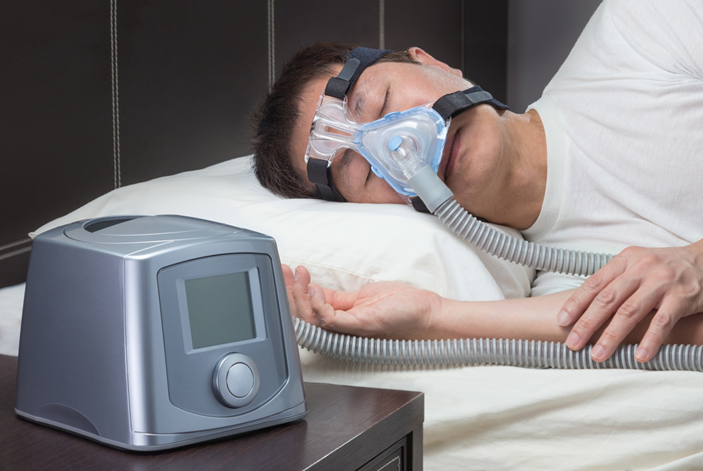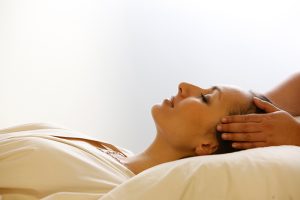What Are the Signs of Sleep Apnea in Adults?

Next time your partner complains about your snoring, you might want to pay closer attention.
Sleep apnea is a serious condition where people momentarily stop breathing in their sleep. And it can have dire health consequences if left untreated.
But according to the American Sleep Apnea Association, 80% of people with sleep apnea are unaware of their condition.
Because sleep apnea occurs while sleeping, it can be difficult to diagnose without participating in a monitored sleep study. Still, there are several signs that your bed partner may notice, as well as some sleep apnea symptoms that occur after waking.
Watch out for these common signs of sleep apnea in adults.
Loud Snoring
Not all snorers have sleep apnea, but nearly all people with sleep apnea frequently snore.
Loud snoring is especially common in those who have obstructive sleep apnea, a form of sleep apnea where throat muscles relax. People with obstructive sleep apnea don’t only snore sometimes—they regularly snore, often so loudly it can wake up others nearby.
Sleep apnea snoring may also be accompanied by snorting sounds, or snoring may regularly stop for several seconds at a time before restarting.
Gasping for Air
One of the hallmark warning signs of sleep apnea is gasping for air in the middle of the night. This typically happens after you’ve stopped breathing, and your body is alerting you it needs oxygen.
You may wake suddenly, feeling short of breath and gasping for air. And even if you sleep through it, other people near you may report hearing you gasping while sleeping.
Either way, this is a common sign of sleep apnea that shouldn’t be ignored.
Interrupted Sleep
If you often have trouble staying asleep, sleep apnea could be the culprit.
When you can’t properly breathe during the night, it’s difficult for your body to stay in rest mode. Then, you may notice that you regularly have to wake up to use the bathroom, or that you feel restless when you should be sleeping.
If you can’t pinpoint another clear cause for your interrupted sleep, it could be because of trouble breathing at night.
Morning Dry Mouth and Sore Throat
People who snore may sometimes wake up with a dry mouth and throat. But take note if you regularly experience mouth dryness in the morning.
This happens after snoring and mouth breathing throughout the night, which is typical for sleep apnea sufferers.
Occasional dry mouth or sore throat with no other symptoms is typically nothing to worry about. But noticeable snoring along with regular oral dryness is worth paying attention to.
Morning Headaches
A night of poor sleep may result in a nasty morning headache. And this is especially true for people with sleep apnea.
Because sleep apnea limits the amount of oxygen in the body, it also affects how much oxygen reaches the brain.
And when the brain doesn’t receive enough oxygen, it can lead to recurring morning headaches.
Regular Drowsiness and Trouble Functioning
People who struggle to get a good night’s rest from sleep apnea usually suffer through daytime drowsiness.
Feeling sleepy and dull day after day can wreak havoc on your life. You may notice that you have trouble remembering things or that focusing on work has become nearly impossible.
And when you constantly feel sleepy, it’s normal to experience some irritability and mood swings.
This can even lead to greater mental health issues, such as depression and anxiety due to the regular stress put on the body from not getting enough quality sleep.
What to Do if You Think You Have Sleep Apnea
Because sleep apnea can cause serious health problems like heart disease, stroke, and even death, it’s important to find a suitable treatment as soon as possible.
Signs like snoring and sleep troubles aren’t enough to determine if you have sleep apnea. It’s crucial to talk to your doctor for an official diagnosis, which may require participating in a sleep study or monitoring your sleep at home with a medical device.
If you think you have sleep apnea, your doctor may also refer you to a sleep specialist for the most in-depth diagnosis and treatment options.
Sleep Apnea Treatment
There are several sleep apnea treatment options available, depending on your specific type of sleep apnea and symptoms.
In some cases, lifestyle changes like losing weight and stopping smoking can be enough to alleviate sleep apnea. But when these changes aren’t enough, your doctor will turn to other forms of treatment and therapy.
Breathing devices can be highly effective, though a little uncomfortable at first. One of the most common types is a mask worn at night, attached to an air pressure machine. This type of device keeps airways open, preventing sleep apnea breathing problems, and snoring.
Dental appliances can also be an effective and less bothersome treatment compared to nighttime breathing masks. Sleep apnea dentistry focuses on oral devices that hold the jaw and/or tongue in place to prevent breathing obstruction. Your doctor may refer you to a dentist who specializes in these sleep apnea devices.
Signs of Sleep Apnea in Adults
How well you sleep at night can affect your entire life. And if you’re struggling with breathing problems due to sleep apnea, you may suffer the consequences of daily drowsiness and serious health problems.
Look for these signs of sleep apnea in adults, and make an appointment with your doctor if you think you may have sleep apnea.
For more advice on staying healthy, check out our other health articles!






